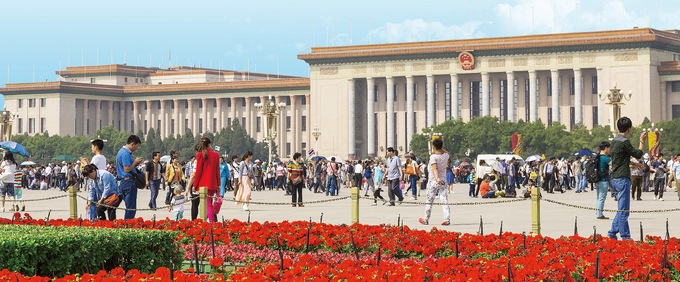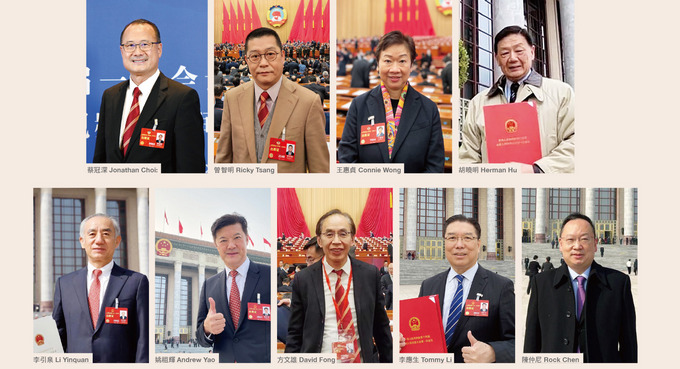 Many of the Chamber's office-bearers are also NPC deputies or CPPCC National Committee members. Earlier, they attended the annual plenary sessions of the NPC and the CPPCC National Committee (“Two Sessions”) to express their views on issues such as the economic development and social livelihoods of the country and Hong Kong as well as post-pandemic return to normalcy, and technological progress, actively involving themselves in government and political affairs.
Many of the Chamber's office-bearers are also NPC deputies or CPPCC National Committee members. Earlier, they attended the annual plenary sessions of the NPC and the CPPCC National Committee (“Two Sessions”) to express their views on issues such as the economic development and social livelihoods of the country and Hong Kong as well as post-pandemic return to normalcy, and technological progress, actively involving themselves in government and political affairs.
Jonathan Choi: Country's care for Hong Kong boosts confidence in post-pandemic development
Jonathan Choi, the Chamber's Chairman (CPPCC National Committee Standing Committee Member), said that this year's “Two Sessions” is of great significance as it, building on the past to herald the future, sets a comprehensive stage for modernization. In this regard, he has three takeaways:
Firstly, the new leadership team has brought together the collective will of over a billion people. Xi Jinping was unanimously elected President of our country and Chairman of the Central Military Commission (CMC) of our country, which, reflecting the people's common will and historical choice, is an important guarantee for the country's strength and prosperity. The new leadership of the State Council and state agencies, while young and vigorous, has extensive track records and experiences. With most of the heads of ministries and commissions remaining in office, they should be able to get work done smoothly amid the complex and ever-changing domestic and international landscape and ensure the continuity and stability of governance.
Secondly, it once again shows the Central Government's care and love for Hong Kong. In his speech, President Xi stressed that the long-term prosperity and stability of Hong Kong and Macao are part and parcel of building a strong China. He also stressed that the Central Government will always attach great importance to leveraging the unique strengths of Hong Kong and Macao, resolutely implement the “One Country, Two Systems” policy, and fully support Hong Kong and Macao in their efforts to integrate themselves into the country's overall development. President Xi's remarks, which accurately express the sentiments of the Hong Kong people, have boosted our confidence in the country's development and Hong Kong's prospects.
Thirdly, it has given a shot in the arm for private entrepreneurs. As the country goes all out to grow the economy after the pandemic, leaders at all levels have repeatedly underscored the need to safeguard the private economy in terms of policies and public opinions at the “Two Sessions”, which at the same time provides a broader stage for Hong Kong to integrate into the country's development. In his view, the Chamber should better unite the industrial and commercial sectors to actively participate in the construction of the Guangdong-Hong Kong-Macao Greater Bay Area (Greater Bay Area) and the “Belt and Road” Initiative (B&R) so as to create new glory for Hong Kong in the process of following the country's development strategies.
Ricky Tsang: Work with Mainland to enhance Hong Kong youths' national identity
As President Xi Jinping said: “Hong Kong will prosper when its young people thrive.” Ricky Tsang, the Chamber's Vice-Chairman (CPPCC National Committee Member) also focused on our young people in his proposal submitted during this year's “Two Sessions”.
He pointed out that a fairly large number of Hong Kong's young people still do not have a firm sense of identity with the country. To this end, he suggested the relevant national ministries and the HKSAR Government strengthen cooperation to use the schools and social media to continue enhancing education on history, culture and the country's basic conditions in tandem with the HKSAR Government's recently released Youth Development Blueprint, with the aim of comprehensively improving the national and ethnic identity of Hong Kong's young people.
In Tsang's view, encouraging Hong Kong's young people who are unable to study at Hong Kong's tertiary education institutions to further their study in the Mainland is one of the ways to strengthen their national identity. As for the younger group, he suggested the education ministries of the Mainland and Hong Kong team up in setting up a number of Hong Kong-style public primary and secondary schools in Shenzhen. Such schools, which will adopt the Hong Kong-style teaching model and be funded by the HKSAR Government, can save them the hassle of traveling between the two places and boost a return of hearts.
Tsang said that economic cooperation is necessary to achieve the above effects. In another proposal, he suggested that Hong Kong and the Nansha Free Trade Zone cooperate on all fronts to form a multiplier effect, making both places the Greater Bay Area's main economic growth drivers, and accelerating and increasing the efficiency of its development.
Regarding this year's “Two Sessions” continuing to adopt “closed-loop” management, Tsang is of the view that such a strict approach was really necessary as it protected the health of participating members and ensured the smooth running of the sessions.
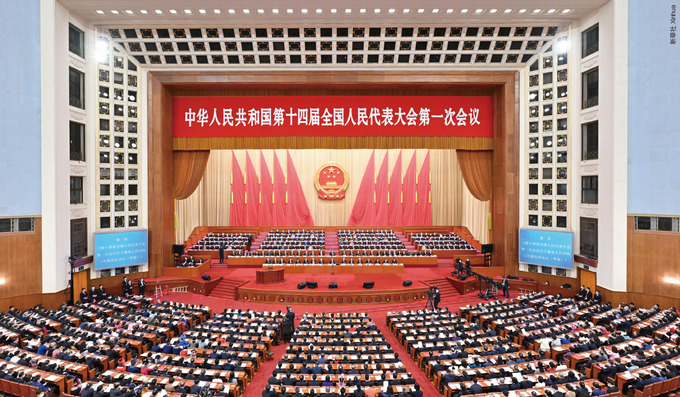
Connie Wong: Drive development of scientific research through policies, talents and funds
In the 20th CPC National Congress report, President Xi Jinping stressed that science and technology are our country's primary productive force. During this year's “Two Sessions”, Connie Wong, the Chamber's Vice-Chairman (CPPCC National Committee Standing Committee Member), who has always paid very close attention to the development of scientific research, presented her views on how Hong Kong can integrate into the country's development in terms of scientific research.
In her view, it is necessary to leverage the “Shenzhen-Hong Kong Innovation and Technology Co-operation Zone in the Lok Ma Chou Loop” to deepen scientific and technological cooperation, build a high-tech international innovation and technology hub, and attract international talents and enterprises for the country. In addition, it is prudent to re-examine the administrative processes and improve the approval procedures, and formulate policies for the Co-operation Zone to facilitate cross-boundary flow of scientific research funds and provide cross-boundary channels for international top scientists to apply for scientific research funds for Mainland projects. She further said that, for those human biological samples and materials, special technologies and professionals that are currently not allowed to freely enter and exit Hong Kong and the Mainland, relevant restrictions should be removed to boost the effectiveness of scientific research. She also hopes for a professional division of labor, i.e., dividing research and development into three stages, i.e., upstream, midstream and downstream, to more accurately turn scientific research results into products for the market.
Scientific research depends on talents for it to succeed. In Wong's view, Guangdong, Hong Kong and Macao should strengthen joint efforts in running schools, nurturing talents and teaching basic academic disciplines. In addition, a more open mindset should be adopted to put in place special green channels for professionals in certain fields in order to attract international talents. She also suggested leveraging Hong Kong's role as an international financial center to assist science and technology innovation companies in seeking financing for development.
Herman Hu: Chinese-style democracy is truly suitable for China's national conditions
Herman Hu, the Chamber's Vice-Chairman (NPC Deputy) said that his participation in this year's “Two Sessions” in Beijing has left a deep impression on him, and he would like to share a few points. Firstly, President Xi Jinping's unanimous re-election as President of the country, which reflects the people's love, respect and support for him, is a display of Chinese-style democracy to the world. This shows that the country has entered a new era filled with hope and opportunities.
In addition, the many achievements mentioned in the Government Work Report have not come easily, e.g., the global miracle of successfully lifting 100 million people out of poverty, a GDP of over RMB120 trillion and a foreign reserve of more than USD3 trillion. These are the evidence of the superiority of Chinese modernization and social system and lay a solid foundation for our country's future development. Economic development, which is the top priority going forward, needs expansion of domestic demand and continuing efforts in attracting foreign investment, and Hong Kong can continue to play an important role in attracting foreign investment to serve the country's needs.
This year's “Two Sessions” also embodies the distinctive strengths of Chinese-style democracy. The amendment to the Legislation Law is a case in point. Whole-process people's democracy has been the key principle guiding the amendment to ensure that the people's voices are heard in all aspects of the legislative work so that they can be the masters of the country, striving to bring a sense of happiness, fulfilment and security to their lives. According to an article published on the website of The Washington Post, Cary Wu, Assistant Professor of Sociology at York University in Canada, said his research showed that Chinese citizens' trust in their national government increased to 98%. It can therefore be said that Chinese-style democracy is indeed suitable for China's national conditions, and it is also evident from the country's development achievements that it has made the biggest impact in China.
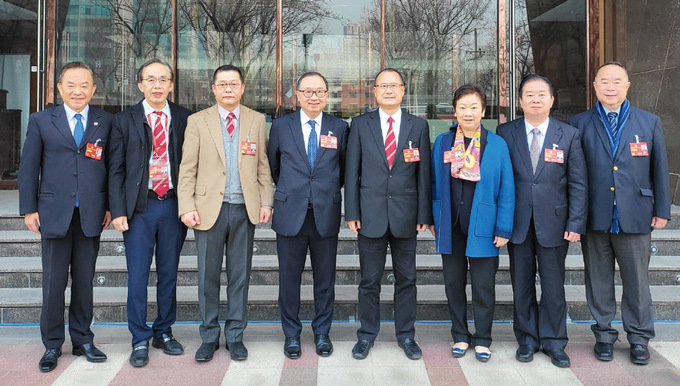
Li Yinquan: Harmonise the treatment for Hong Kong, Macao and Mainland residents
Movements of people between Hong Kong and the Mainland have gradually resumed with the full resumption of normal cross-boundary travel in 2023. Li Yinquan, the Chamber's Vice Chairman (NPC Deputy) presented a proposal at this year's NPC session on giving Hong Kong's and Macao's Chinese nationals in the Mainland the same treatment as Mainland residents. Given the return to normalcy post-COVID-19, he suggested to further promote the flow of people, goods, capital and information among Hong Kong, Macao and the Mainland, especially to facilitate the movement of people.
Li said that the “Mainland Travel Permit for Hong Kong and Macao Residents” (Home Return Permit), issued by the Mainland's Ministry of Public Security to Chinese nationals who are permanent residents of or settled in Hong Kong and Macao, is a legal identification document for Chinese nationals among Hong Kong and Macao residents in the Mainland. He suggested giving holders of the Home Return Permit the same treatment as holders of the Mainland's Resident Identity Card in terms of travel, schooling, employment, investment, business establishment, industry access, industry supervision, taxation, social security and medical insurance in the Mainland. This move is conducive to the mutually beneficial and coordinated economic and social development among the Mainland, Hong Kong and Macao, promoting a further return of the hearts of the people of the latter two places so that they can better integrate into the country's overall development.
Andrew Yao: All Hong Kong sectors join forces to share fruits of national development
New state leaders have been elected at the first session of the 14th NPC which has successfully drawn to a close recently. Andrew Yao, the Chamber's Vice Chairman (NPC Deputy) said that the session focused on summarising the achievements made over the past five years and the historic changes that took place over the past decade in the new era. The country's various undertakings and accomplishments are evidence of this extraordinary decade. 2023 is the first year to fully implement the guiding principles of the 20th CPC National Congress. Under the leadership of President Xi Jinping and the new-term Central Government, the strength from the self-confidence and self-reliance of the people across the country will help China achieve high-quality development and build a modern socialist country.
On the new journey of building a strong China, the country has high hopes for Hong Kong and is confident that Hong Kong will break new ground and achieve another leap forward. Resolutely implementing “One Country, Two Systems” and making sure that “patriots administering Hong Kong” which are the best institutional arrangements for maintaining Hong Kong's long-term prosperity and stability, must be adhered to over the long term. Yao said he is keenly aware that he is entrusted with a lofty mission and important responsibilities, and all sectors in Hong Kong are working in unison to proactively participate in the country's high-quality development with a new stance, getting aligned with the construction of the Greater Bay Area, functioning well as a “super-connector”, going all out to improve people's livelihood and resolving deep-seated conflicts in society to enable our fellow compatriots in Hong Kong to share in the country's development opportunities and achievements.
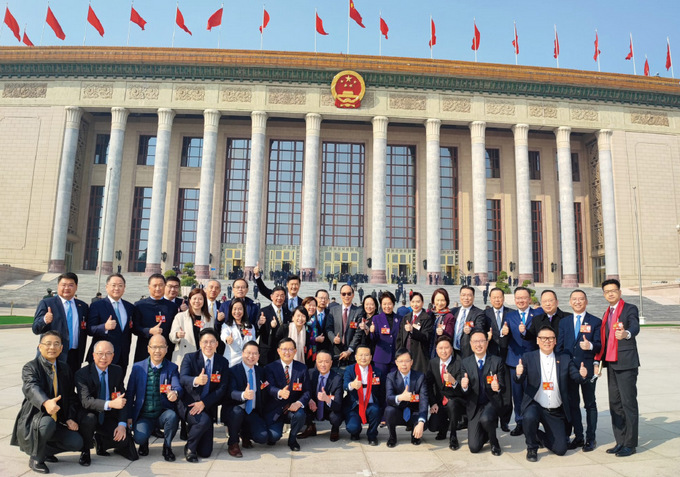
David Fong: Two keywords point to direction of national efforts
This year, which is the first year of fully implementing the guiding principles set forth by the 20th National Congress of the CPC, is also a year when a change in government takes place. David Fong, the Chamber's Life Honorary Chairman (CPPCC National Committee Member), believes that the key national policies announced at the “Two Sessions” are an indication of the country's future development direction and highly relevant to Hong Kong's development. Therefore, the people of Hong Kong must get an in-depth understanding of the country's key policies and broaden their horizons to seek opportunities that belong to Hong Kong.
Fong pointed out two attention-grabbing keywords at this year's “Two Sessions”. One of them is “Chinese path to modernization.” He said that, under the leadership of the CPC, China has achieved rapid growth for many years, so the Chinese people ought to have the courage to set a new path for themselves to realize a Chinese path of modernization. For example, while developing the economy, we should not forget common prosperity, paying equal attention to material civilization and spiritual civilization.
The second is “high-quality development”. Fong said President Xi stressed at the “Two Sessions” that high-quality development is the first and foremost task in building a modern socialist country in all respects. In his view, this shows that China's economy has shifted from a stage of high-speed growth to a stage of high-quality development. All sectors and industries must strive to upgrade towards a high-end, intelligent and green direction to achieve high-quality upgrading and transformation.
With the return of society and the economy to full normalcy, Hong Kong will work with the people of the whole country to strive for high-quality development. With the development opportunities from the “14th Five-Year” Plan, the Greater Bay Area and the B&R right in front of us, Hong Kong should leverage its distinctive advantages of enjoying strong support of the Motherland and being closely connected to the world to contribute to the country and add momentum to itself in order to achieve the goal of “advancing from stability to prosperity”.
Tommy Li: Advancing Chinese Medicine Highlands in Greater Bay Area
With a keen interest in the development of Chinese medicine at the national level, Tommy Li, the Chamber's Life Honorary Chairman (NPC Deputy), has contributed strategic ideas in his submission to this year's ““Two Sessions””. According to Li, the Construction Plan for the Chinese Medicine Highlands in the Guangdong-Hong Kong-Macao Greater Bay Area (the Plan) was announced in 2020. Despite two years of pandemic circumstances, the Plan has been gradually implemented and achieved remarkable effects, thanks to the hard work of local governments and other parties. There is also unanimous praise from the industry. As COVID recedes, he proposed that China and Hong Kong should strengthen their integrated development in the following ways:
1. Establish a Greater Bay Area development center for scientific research on Chinese medicine, where China and Hong Kong specialists and overseas experts can be invited to collaborate on various projects, so as to broaden the construction of the Chinese medicine highlands;
2. Compile a standard catalogue for Chinese medicines for the Greater Bay Area to align the varied standards adopted in the area and expedite integrated development;
3. Currently, proprietary Chinese medicines for external use that are registered and manufactured in Hong Kong and Macao can be sold in the Mainland through streamlined registration application made available by the National Medical Products Administration. Further relaxation is recommended to include proprietary Chinese medicines for internal use that are manufactured in Hong Kong and Macao;
4. “Bringing-in and going-out” is the top priority of the moment. The Mainland's proprietary Chinese medicine products could ride on the Hong Kong platform and tap into the international market, so as to forge an even bigger patriotic Chinese medicine industry;
5. At present, registered Chinese medicine practitioners of Hong Kong and Macao can apply to work in the public healthcare system in the Greater Bay Area. The quota could be further expanded to address the industry's earnest expectations.
Li reckons that, since Chinese medicine is a traditional treasure that has perpetuated for thousands of years, the Plan will bring about boundless opportunities for the Greater Bay Area. China and Hong Kong should regularly exchange ideas and conduct mutual visits to deepen understanding on the latest progress of Chinese medicine in the region, so that the industry could adjust and work incessantly towards the promotion of Chinese medicine.

Rock Chen: Hong Kong should bring out its best and integrate into national development
Rock Chen, the Chamber's Life Honorary Chairman (NPC Deputy) said that Hong Kong should capitalize on its unique “One Country, Two Systems” advantages and synchronize with China's advancement and prosperity. He suggested setting up a connectivity mechanism for new shares under Shanghai and Shenzhen Stock Connect, such that the mutual access between Hong Kong and China can be further propelled, allowing Mainland and Hong Kong investors to purchase new stocks in both markets. He noted that the concept has received positive response from Mainland ministries, which will further study investor protection and other details.
Secondly, Chen believes that Hong Kong can spearhead the construction of a green financial hub with fellow Great Bay Area cities. Mainland cities can provide projects, while Hong Kong can act as a financing center. In the long term, Hong Kong's extensive experience in global accreditation, standards formulation and other areas could be leveraged to establish green financing standards for the 9+2 Greater Bay Area cities.
Thirdly, Hong Kong's integration into the national development relies on the concrete implementation of policies and close collaboration between the civil service teams on both sides. Therefore, he suggested setting up a work attachment system so that Hong Kong civil servants can better understand how policies are formulated and implemented in the Mainland.
As a proponent for the “competing for talents” strategy, Chen suggested seeking talents in emerging countries such as Israel, India, etc. “Many emerging countries possess notable strengths in scientific research. The government could incentivize these talents to advance their careers in Hong Kong by offering housing allowance and similar complementing measures. This could further enhance Hong Kong's momentum for innovation and technology development.”

